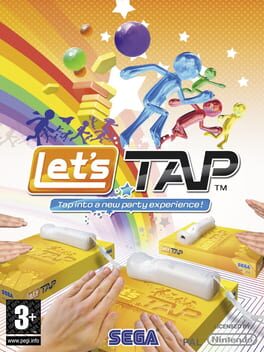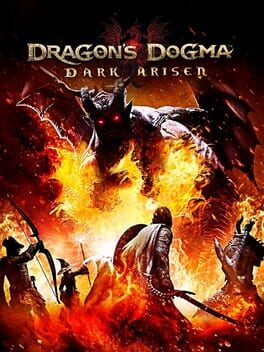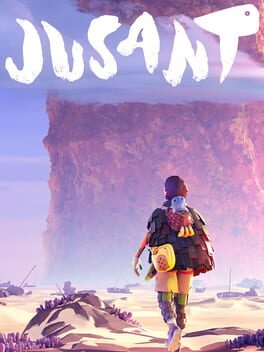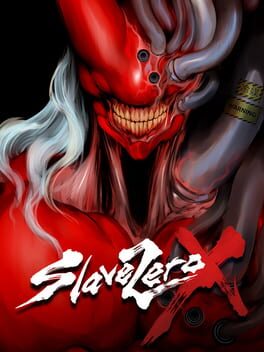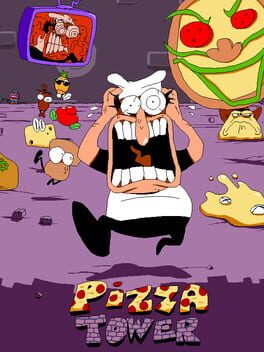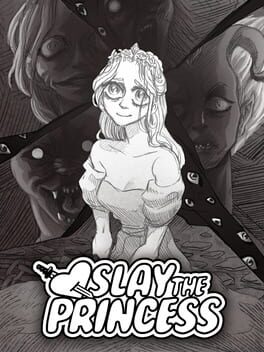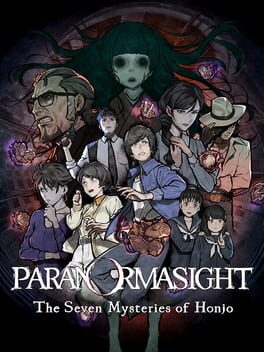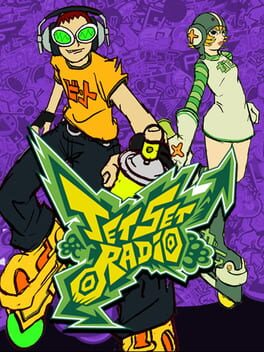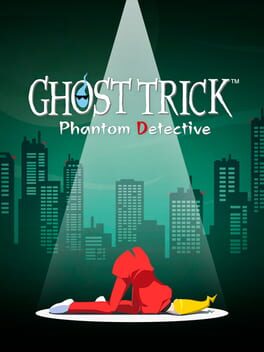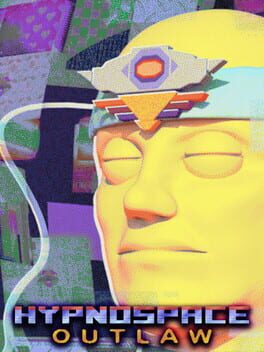Undoubtedly ruins the core mechanic of Wario-Ware by interrupting the gameplay to show you which pose to use, which removes any spontaneity and surprise between mini-games. The novelty and humour make it worth it though. There's a relatively well fleshed out dart minigame thats easy to spend hours on with friends
2008
hopeless mechanic, friends controller fell off the box and caused it to frame perfect pause, next menu, next menu, exit game, none of these games actively benefit from the control scheme but i applaud it for coming up with a control method that registers an even lower percentage of inputs than waggling
A peculiar and strange convergence of seemingly disparate mechanics tells what appears to be a conventional fantasy tale full of fondness for the DnD/LotR creatures and lore it draws from. The last stretch and final ending subverts all of this, from the pawn system to the quest design, or just the worldview logically derived from being a fantasy role-playing game, and re-contextualizes it in a philosophical framework about the nature of free will in a world that frequently exerts its own free will on the people within it. It is about being human and being dehumanized, about breaking the cycle of systemic oppression and leveraging those systems of power to kill its own self in service of allowing others to choose for themselves. Dragons Dogma ended up being much weirder than I could've ever imagined, in more ways than I can count. A game that I predict I will spend quite a bit of time simply ruminating on.
2023
Despite the added fidelity in climbing mechanics, Jusant is about as friction-less as the average Uncharted-like. Yes, the player can choose which handholds to reach for, but they are all so close together and so numerous that any reasonably meaningful choices of placement are nonexistent. It is, admittedly, mechanically satisfying, and the first time you place a pinion to hang from and swing to another ledge is quite a magical feeling, but much of the added mechanics barely add any depth to a game that mimics a real life skill that requires forethought, problem solving and technique. I suppose this isn't quite fair to hold a Journey-esque game to such a standard, so I might as well put that aside to talk about the world and story. I don't really have much to say on that point, it's an A to B adventure where you return a cute animal to it's natural habitat, not a lot of surprises there. I thought the little creature looked like a little butt with legs. I found the representation of a world drained of oceans haunting. I do find it interesting that the narrative in these types of games has shifted from "lets live harmoniously with nature and save the world from climate change" to "how do we cope and live in an inherited world that is beyond saving", which I fear will become increasingly more prevalent as we slowly death march towards the impending climate apocalypse.
2019
Loved the Twin Peaks/SCP world and visual design, but ultimately plays out as a relatively by-the-numbers Action Shooter with weak-willed gestures towards something resembling a metroidvania. The friction between the peculiar and alien rules and mechanics of the world and the utter monotony of what the player actually does (shooting waves of bland enemies and solving box in hole puzzles) is so grating so as to make the whole experience an exercise in disappointment. Despite IP shared universes already feeling like the lamest cash grabs ever, Remedy's Control/Alan Wake universe still catches my attention, it just sucks that it'll likely always be tethered to more of the same tired gameplay loops seen in all modern-era action shooters.
2024
Darn. Was really looking forward to this but this small indie game with alot of style and a talented art director just never really gels together into a cohesive game. There are some really baffling decisions regarding the combat system. I see many other reviews going into how poorly thought out aspects of the combat is, but the bottom line is that its frustrating and tedious. Imagine playing a fighting game where you cant block or techroll (only 3rd strike parry or dash) and your opponent has permanent super armour and spams multihit moves and screen wide command grabs over and over again. Now duplicate that enemy a few times lazily and you have the average Slave Zero X encounter. Why are there no moves to learn except some hidden cheese moves that aren't included in the tutorial? Why are there no supers or finishers? There's a real lack of polish getting all the art and ui and cutscenes to mesh together too. There's flashes of brilliance and real talent on display here, but the lazy encounter design and lack of features make me think this was rushed and merged into a precarious build days before release. I really hope at some point this gets an overhaul because there's a good game hiding here somewhere. I can't believe the one thing I don't really have any complaints about is the characters and voice acting in a story written by a RWBY writer.
2023
2023
Cut this into an 8 hour boss rush sizzle reel and it would have been a semi-competent action game with some of the most insane maximalist set pieces seen in the genre. It's incredible how much all the filler in between those battles drags down the experience. It genuinely feels like you're playing two games, the lesser one being a mid budget mmo-like rpg. I don't see much of a point criticising the story, setting and characters, those parts are so poorly constructed that they may as well be ignored.
2023
The ending left me with the impression that it was deeply personal to someone, but for me personally it gets too lost in the metaphysical elements to really stick the landing emotionally for me. That's okay though, there's tons to chew on with all the different character endings, which truly are intriguing representations for the reactive nature of understanding one another in a relationship.
2019
Probably the most impactful experience I've had in a video game. I've followed this game since it was just a capstone project that I could download for free; over time I've genuinely come to think this is the product of the developer's soul, every good idea he's ever had crammed into a game that is a thesis for his lived experience.
It all culminates in a surprisingly spiritual ending, with each of the secrets you've uncovered revealing a deeper unknown in which we can be comforted by, a way to confront and quell the nihilism that so often infects those that adhere to science and reason, that we can have love and have learning, and together that is understanding, it is empathy, not only for humanity but for all things, all creatures, all molecules, for things that are still unknown, still not learnt, but we understand and we love all these things and cherish them even when they leave and we are gone.
It all culminates in a surprisingly spiritual ending, with each of the secrets you've uncovered revealing a deeper unknown in which we can be comforted by, a way to confront and quell the nihilism that so often infects those that adhere to science and reason, that we can have love and have learning, and together that is understanding, it is empathy, not only for humanity but for all things, all creatures, all molecules, for things that are still unknown, still not learnt, but we understand and we love all these things and cherish them even when they leave and we are gone.
2012
As everyone knows, amazing aesthetics. The presentation and ideas in JSF are novel and top notch and perfectly exemplifies the 00's dreamcast counterculture that everyone is so nostalgic for. Unfortunately, I cannot say the same for the gameplay. I can handle jank, but the level design (while beautiful to look at) really highlights all the worst parts of the controls. Tight spaces and tiny ledges make huge frustrating falls happen often (screw you grind square), and making the trek back up afterwards is slow and tedious. Unlocking new characters requires you to complete a "showdown", the worst of these being a chase across the level to graffiti a spot first. I think these are designed to teach the player to move from zone to zone in the level but the result is a 7 minute snorefest following a character slog its way through long tunnels and staircases. Also, the lategame enemies that shoot you on jetpacks are just miserable. Oh well, the music kept me entertained in the meantime.
Ghost Trick interprets the Rube Goldberg machine as a metaphor for the interconnected fates of human (and non-human) lives. What does it take to influence our lives and those of others? What special powers would we require? Ghost Trick answers: not very much. Just a little push here, a few words of encouragement there, are enough for the butterfly effects to propagate.
A game that deftly weaves its gameplay and narrative together into a snappy, creative puzzle adventure. This is Shu Takumi at his peak. Every character is a lovable X, be it villain, dolt, father, daughter, whatever. Each of them is a little goofy and a little unhinged, but endearing above all else. There's a kinetic energy and humor embedded in everything from the dialogue and music to the character portraits and exaggerated 3D character animations.
This is the RE4 of adventure games. Just so incredibly well-paced. As a result, the puzzles never become too complex and the decision trees trimmed short, which feels perfectly reasonable in service of keeping things fresh and enjoyable for the entire runtime. I'm kicking myself for not playing this earlier.
A game that deftly weaves its gameplay and narrative together into a snappy, creative puzzle adventure. This is Shu Takumi at his peak. Every character is a lovable X, be it villain, dolt, father, daughter, whatever. Each of them is a little goofy and a little unhinged, but endearing above all else. There's a kinetic energy and humor embedded in everything from the dialogue and music to the character portraits and exaggerated 3D character animations.
This is the RE4 of adventure games. Just so incredibly well-paced. As a result, the puzzles never become too complex and the decision trees trimmed short, which feels perfectly reasonable in service of keeping things fresh and enjoyable for the entire runtime. I'm kicking myself for not playing this earlier.
2019
Funny, smart, but most of all, kind. A whole world and cast of characters presented through nostalgic web 1.0, with layers and layers to peel back as you peer deeper and deeper into the web and into people's lives - some sad, some comedic, some nefarious. Somehow in this massive world with its immense amounts of well produced content and media is an immensely satisfying puzzle experience, and on top of that is an excellent narrative that really examines and empathizes with the colorful people in this world. I put this next to Obra Dinn and Outer Wilds - experiences I will remember forever.
2019
I think Eliza does a good job exploring the ethics and moral frameworks held up by the various people with power in the tech industry. Although Eliza skirts around topics like the medical industrial complex, AI, ethics and philosophy, it is at its core a story about how uniquely unqualified the tech industry is at approaching human problems and how they do it with the utmost carelessness. In place of ethics or holistic research is ingrained a capitalist hubris to dream big and solve interesting problems without considering how those solutions fit into society and the systems it lives in.
A lot of this feels very personal, written out of the direct experiences one would have after working in the tech industry. Much of what I've been grappling with in the last few years maps pretty directly to the themes and feelings in this story. I found myself empathizing a lot with the societal withdrawal Evelyn experiences and just the way she disassociates, how she handles her personal relationships and the feelings of nothingness that aren't quite good but are comforting in some ways.
The therapy sessions were visceral. There were some that resonated so much with me. I wish their problems weren't dashed to the side so quickly to make room for the tech characters to ruminate on their personal philosophies and impact on society. It really feels antithetical to everything that came before, to criticize tech bro mentalities only for Evelyn to become an Important Figure that must decide the fate of herself and Many People.
Despite this, I think its heart is in the right place. The story of Eliza doesn't say anything too confidently, and doesn't call for radical change. But I think this is because its creators are learning to do one thing that runs opposite to the system they've been a part of for so long - be humble. Be a small change. It's okay for now.
A lot of this feels very personal, written out of the direct experiences one would have after working in the tech industry. Much of what I've been grappling with in the last few years maps pretty directly to the themes and feelings in this story. I found myself empathizing a lot with the societal withdrawal Evelyn experiences and just the way she disassociates, how she handles her personal relationships and the feelings of nothingness that aren't quite good but are comforting in some ways.
The therapy sessions were visceral. There were some that resonated so much with me. I wish their problems weren't dashed to the side so quickly to make room for the tech characters to ruminate on their personal philosophies and impact on society. It really feels antithetical to everything that came before, to criticize tech bro mentalities only for Evelyn to become an Important Figure that must decide the fate of herself and Many People.
Despite this, I think its heart is in the right place. The story of Eliza doesn't say anything too confidently, and doesn't call for radical change. But I think this is because its creators are learning to do one thing that runs opposite to the system they've been a part of for so long - be humble. Be a small change. It's okay for now.

